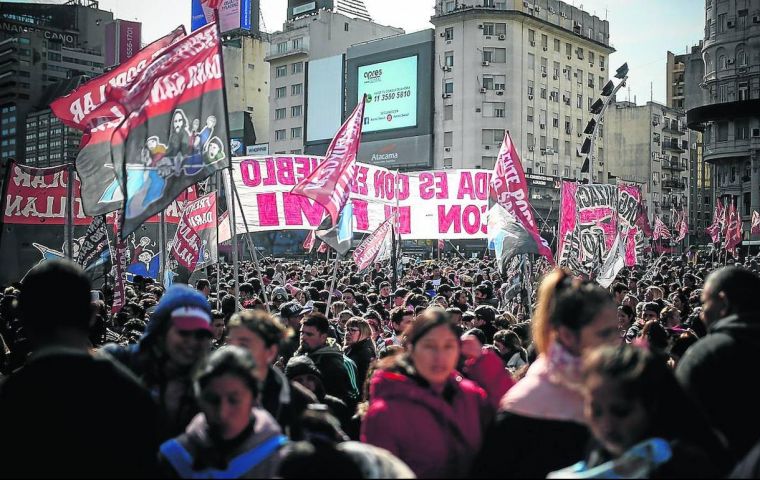MercoPress. South Atlantic News Agency
Argentina’s Economic Crisis: Who to blame?
 According to the IMF, GDP per person grew by 42%, almost three times the rate of Mexico. Unemployment fell by more than half, and income inequality also fell
According to the IMF, GDP per person grew by 42%, almost three times the rate of Mexico. Unemployment fell by more than half, and income inequality also fell  From an economist or social scientist’s perspective, it’s not clear why Kirchnerism should inspire fear
From an economist or social scientist’s perspective, it’s not clear why Kirchnerism should inspire fear Argentines remember the role the IMF played in the last depression. They also remember the improvement in their lives under Kirchnerism. The following was published by The New York Times.
What are we to make of Argentina’s surprise election results on Aug. 11, which jolted pollsters and analysts alike, and roiled the country’s financial markets? In the presidential primary for the country’s October election, the opposition ticket of Alberto Fernández trounced President Mauricio Macri by an unexpected margin of 15.6 percent.
The Fernández coalition attributes its victory to Mr. Macri’s failed economic policies, blaming him for the current economic crisis, recession and high inflation. Mr. Macri, by contrast, blames the fear of a future government of Kirchnerism — his label for the opposition — for the postelection financial turbulence as well as the problems of the economy since he took office more than three and a half years ago. He argues that both the markets and the people have everything to fear from such an outcome.
This disagreement is not just an academic argument, nor one specific to Argentina. It is a recurring, almost archetypical debate during economic crises that spill over into political contests. In recent years — in Britain, Spain, France, Greece and other countries where failed economic policies faced left-of-center challengers — Mr. Macri’s refrain was a frequent line of attack by incumbents.
Financial markets can move for many reasons, which can be unclear or even based on misperceptions of reality. In the case of last week’s news, we have electoral losses by a government whose economic policies have clearly failed and gains by challengers who hail from a period of strong and widely shared economic growth. This is not something that is inherently bad for the economy.
With Kirchnerism, Mr. Macri refers to the policies, followers and presidential administrations of the Kirchner family, which held office from 2003 to 2015 — first Néstor Kirchner, and then Cristina Fernández de Kirchner. Ms. Kirchner is running as the vice-presidential candidate on Alberto Fernández’s ticket and is a prominent leader of the opposition coalition — although this Peronist coalition is much larger and broader than the “Kirchnerista” base.
From an economist or social scientist’s perspective, it’s not clear why Kirchnerism should inspire fear. Looking at the most important economic and social indicators, the governments of the Kirchner presidencies were among the most successful in the Western Hemisphere.
Independent estimates show a decline of 71 percent in poverty and an 81 percent decline in extreme poverty. The government instituted one of the biggest conditional cash transfer programs for the poor in Latin America. According to the International Monetary Fund, gross domestic product per person grew by 42%, almost three times the rate of Mexico. Unemployment fell by more than half, and income inequality also fell considerably. The 12 years the Kirchners held office resulted in large increases in living standards for a vast majority of Argentines, by any reasonable comparison.
Economic growth waned in the last few years of Ms. Kirchner’s presidency. The government made some mistakes and was also dealt an external economic blow. A 2012 ruling by a federal appeals court in New York — a decision widely regarded as dubious and political — took more than 90 percent of Argentina’s creditors hostage to force payment to a small group of “vulture funds” that refused to join the debt restructuring of the early 2000s. The United States government blocked loans from international lenders such as the Inter-American Development Bank, at a time when the economy needed the foreign exchange.
By comparison, poverty has increased significantly, income per person has fallen, and unemployment has increased during Mr. Macri’s term, which began in December 2015. Short-term interest rates have shot up to 75% today from 32%; inflation has soared to 54% from 18%. The public debt has grown to more than 86% of G.D.P. from 53%.
How much of this economic crisis and poor performance is his predecessor’s fault?
In 2018 Mr. Macri signed an agreement for a US$ 57 billion loan — the largest I.M.F. bailout in history. The loan agreement, along with the reviews since, detail the government’s economic goals, strategy and execution. There is a lot of information publicly available that lays out what went wrong.
The main strategy of the program was to restore investor confidence through tighter fiscal and monetary policy. But, as has often happened, these measures slowed the economy and undermined investor confidence. By October, the results were vastly worse than the I.M.F. had projected. The government and I.M.F. increased both fiscal and monetary tightening, but it did not help.
The government also wasted more than US$ 16 billion in unsuccessful attempts to keep the peso from falling and greatly increased the more problematic foreign component of the public debt. The result has been near-constant recession and high inflation, enormous interest rates, peso depreciation, financial instability and the huge run-up in public debt. The debt increase is particularly noteworthy because Mr. Macri inherited a low level of public debt.
Ironically, the I.M.F. is well known in Argentina for promoting similarly unworkable policies during the deep depression of 1998 to 2002 — comparable to America’s Great Depression of the 1930s. Yes, history is repeating itself, although in this case the I.M.F. has a stronger partnership with the government than it had 20 years ago.
The Fernández candidates will have to outline how they would get out of this mess. They can explain how Argentina exited from a much more severe economic crisis, with an unemployment rate more than twice as high and millions of previously middle-class people having fallen into poverty. They can assure creditors that there is no need for default on the public debt today, as there was then, because it was completely unpayable. But, as in 2003, the economy cannot recover under the conditions agreed upon with the I.M.F., and they will have to be renegotiated.
Millions of Argentines remember the last depression and the role the I.M.F. played. Many also remember the rapid improvement in people’s lives over the ensuing decade. That collective memory and consciousness may now determine the outcome of this recurring debate over the economy, and with it, the October election, and possibly much of Argentina’s future.
By Mark Weisbrot
(*) Weisbrot is a co-director of the Center for Economic and Policy Research in Washington and the president of Just Foreign Policy. He is also the author of ”Failed: What the ‘Experts’ Got Wrong About the Global Economy.”




Top Comments
Disclaimer & comment rules-

-

-

Read all commentsThis story fails to point out that, especially in later K years, the improvements in standards were funded by printing money so they were not sustainable and the CFK government hid the resulting high inflation and depreciating peso by providing false statistics. Also, they weren't paying debts or fines for some of their illegal actions. CFK left the country in technical default. If everything was so great, why did Macri win the election?
Aug 23rd, 2019 - 05:40 pm +1The price had to be paid by Macri's government. As I predicted, when Macri gained power the official peso devalued to close to the blue rate which was evidently the true market rate. Also, the cost of energy was subsidised to an unrealistically low level so when Macri started to charge closer to a commercial, more sustainable, rate (but still less expensive than neighbouring countries) it was a shock to the system. I think Macri's problem was that he often did the right thing in the wrong way - more gradual changes may have been better. He also didn't explain why he was making changes in an attempt to get the population on side so was exposed by the oppositions propaganda.
Will FF be able to turn the economy around like the Ks did? If so, will it be done in a sustainable, non-corrupt manner? We'd hope so, but hope is not a good strategy. Alberto may say he rules out another default, but that will depend on his government's credibility with investors and they've had their fingers burnt by his VP which explains the market reaction so it could be difficult for him to deliver on that one. We shall see...
Why blame?
Aug 27th, 2019 - 09:42 am +1The crisis being permanent, the Agries seem to be enjoying it!
“The 12 years the Kirchners held office resulted in large increases in living standards for a vast majority of Argentines.”
Aug 21st, 2019 - 06:49 pm -1“By comparison, poverty has increased significantly, income per person has fallen, and unemployment has increased during Mr. Macri’s term...Short-term interest rates have shot up to 75% today from 32%; inflation has soared to 54% from 18%...public debt has grown to more than 86% of G.D.P. from 53%.”
There: in two paragraphs, the full story made short. The Macri government was on a mission to dramatically reduce the portion of the national income received by the lower classes, to concentrate it in a few wealthy ones, corporations, associates and friends. A condition of success for the project was to drive Peronism to extinction or to significantly reduce its capacity.
An obscene combination of unbridled greed and insensitivity, however, shocked the population, which showed its little tolerance to increasing poverty, inflation and unemployment through their Aug. 11 vote.
Thus ends Argentina's first attempt to oligarchic restoration through democratic means, as opposed to a military coup as done in the past.
Won't be missed.
Commenting for this story is now closed.
If you have a Facebook account, become a fan and comment on our Facebook Page!